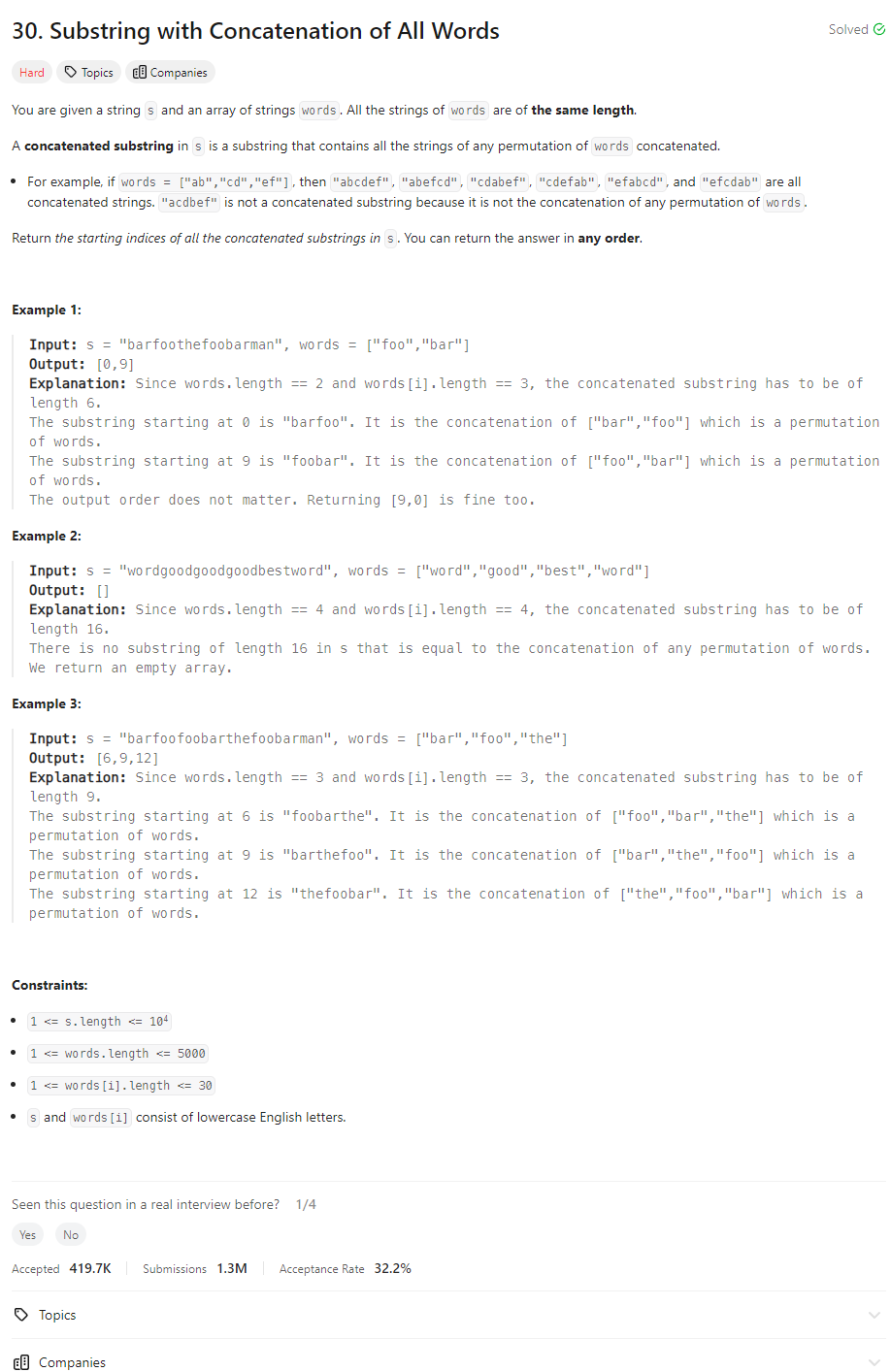Problem of The Day: Substring with Concatenation of All Words
Problem Statement
My note:
- My brute force approach is accepted. But it’s quite slow.
- Need to review the editorial solution again.
Intuition
My initial thought is to use a sliding window approach to iterate through the string and check for valid substrings.
Approach
I’ll use a sliding window of the same length as the concatenated words to move through the given string. At each step, I’ll check if the substring is a valid concatenation by counting the occurrences of each word in the substring. If the counts match the expected counts from the given list of words, I’ll consider it a valid substring and add its starting index to the result.
To optimize the process of checking validity, I’ll use a Counter to keep track of the expected counts of words from the given list.
Complexity
-
Time complexity: O(N * M * K), where N is the length of the string, M is the number of words, and K is the average length of each word.
-
Space complexity: O(M * K), where M is the number of words and K is the average length of each word.
Code
class Solution:
def findSubstring(self, s: str, words: List[str]) -> List[int]:
counter = Counter(words)
res = []
length = len(words[0])
words_length = len(words) * length
N = len(s)
def isValid(curr_s):
i = 0
curr_counter = Counter()
while i < len(curr_s):
word = curr_s[i:i+length]
curr_counter[word] += 1
if curr_counter[word] > counter[word]:
return False
i += length
return True
for start in range(N - words_length + 1):
curr = s[start:start+words_length]
first_word = curr[:length]
if first_word in words and isValid(curr):
res.append(start)
return res
Editorial Solution
Approach 1: Check All Indices Using a Hash Table
class Solution:
def findSubstring(self, s: str, words: List[str]) -> List[int]:
n = len(s)
k = len(words)
word_length = len(words[0])
substring_size = word_length * k
word_count = collections.Counter(words)
def check(i):
# Copy the original dictionary to use for this index
remaining = word_count.copy()
words_used = 0
# Each iteration will check for a match in words
for j in range(i, i + substring_size, word_length):
sub = s[j : j + word_length]
if remaining[sub] > 0:
remaining[sub] -= 1
words_used += 1
else:
break
# Valid if we used all the words
return words_used == k
answer = []
for i in range(n - substring_size + 1):
if check(i):
answer.append(i)
return answer
Approach 2: Sliding Window
class Solution:
def findSubstring(self, s: str, words: List[str]) -> List[int]:
n = len(s)
k = len(words)
word_length = len(words[0])
substring_size = word_length * k
word_count = collections.Counter(words)
def sliding_window(left):
words_found = collections.defaultdict(int)
words_used = 0
excess_word = False
# Do the same iteration pattern as the previous approach - iterate
# word_length at a time, and at each iteration we focus on one word
for right in range(left, n, word_length):
if right + word_length > n:
break
sub = s[right : right + word_length]
if sub not in word_count:
# Mismatched word - reset the window
words_found = collections.defaultdict(int)
words_used = 0
excess_word = False
left = right + word_length # Retry at the next index
else:
# If we reached max window size or have an excess word
while right - left == substring_size or excess_word:
# Move the left bound over continously
leftmost_word = s[left : left + word_length]
left += word_length
words_found[leftmost_word] -= 1
if words_found[leftmost_word] == word_count[leftmost_word]:
# This word was the excess word
excess_word = False
else:
# Otherwise we actually needed it
words_used -= 1
# Keep track of how many times this word occurs in the window
words_found[sub] += 1
if words_found[sub] <= word_count[sub]:
words_used += 1
else:
# Found too many instances already
excess_word = True
if words_used == k and not excess_word:
# Found a valid substring
answer.append(left)
answer = []
for i in range(word_length):
sliding_window(i)
return answer
